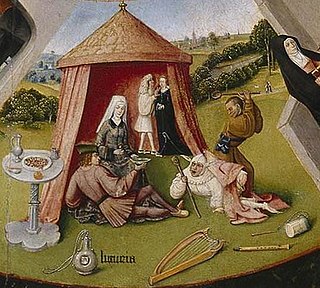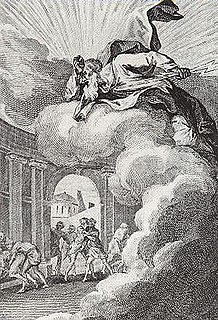Related Research Articles

Lust is a psychological force producing intense desire for something, or circumstance while already having a significant amount of the desired object. Lust can take any form such as the lust for sexuality, money, or power. It can take such mundane forms as the lust for food as distinct from the need for food or lust for redolence, when one is lusting for a particular smell that brings back memories. It is similar to but distinguished from passion, in that passion propels individuals to achieve benevolent goals whilst lust does not.
Capital punishment in the United Kingdom was used from ancient times until the second half of the 20th century. The last executions in the United Kingdom were by hanging, and took place in 1964, before capital punishment was suspended for murder in 1965 and finally abolished for murder in 1969. Although unused, the death penalty remained a legally defined punishment for certain offences such as treason until it was completely abolished in 1998. In 2004 the 13th Protocol to the European Convention on Human Rights became binding on the United Kingdom, prohibiting the restoration of the death penalty for as long as the UK is a party to the convention.

The Buggery Act 1533, formally An Acte for the punishment of the vice of Buggerie, was an Act of the Parliament of England that was passed during the reign of Henry VIII.
Molly-house was a term used in 18th- and 19th-century Britain for a meeting place for homosexual men. The meeting places were generally taverns, public houses, coffeehouses or even private rooms where men could either socialise or meet possible sexual partners.
The following is a timeline of lesbian, gay, bisexual, and transgender (LGBT) history.

John Atherton was the Anglican Bishop of Waterford and Lismore in the Church of Ireland. He and John Childe were both tried and executed for buggery in 1640.
Thomas Graunger or Granger was one of the first people hanged in the Plymouth Colony and the first known juvenile to be sentenced to death and executed in the territory of today's United States. He was a servant to Travis Scott, of Duxbury, in the Plymouth Colony of British North America. Graunger, at the age of 16 or 17, was convicted of "buggery with a mare, a cow, two goats, divers sheepe, two calves, and a turkey", according to court records of September 7, 1642.
Capital punishment in France is banned by Article 66-1 of the Constitution of the French Republic, voted as a constitutional amendment by the Congress of the French Parliament on 19 February 2007 and simply stating "No one can be sentenced to the death penalty". The death penalty was already declared illegal on 9 October 1981 when President François Mitterrand signed a law prohibiting the judicial system from using it and commuting the sentences of the seven people on death row to life imprisonment. The last execution took place by guillotine, being the main legal method since the French Revolution; Hamida Djandoubi, a Tunisian citizen convicted of torture and murder on French soil, who was put to death in September 1977 in Marseille.
The history of zoophilia and bestiality begins in the prehistoric era, where depictions of humans and animals in a sexual context appear infrequently in European rock art. Bestiality remained a theme in mythology and folklore through the classical period and into the Middle Ages and several ancient authors purported to document it as a regular, accepted practice—albeit usually in "other" cultures.
Section 11 of the Criminal Law Amendment Act 1885, commonly known as the Labouchere Amendment, made "gross indecency" a crime in the United Kingdom. In practice, the law was used broadly to prosecute male homosexuals where actual sodomy could not be proven. The penalty of life imprisonment for sodomy was also so harsh that successful prosecutions were rare. The new law was much more enforceable. It was also meant to raise the age of consent for heterosexual intercourse. Section 11 was repealed and re-enacted by section 13 of the Sexual Offences Act 1956, which in turn was repealed by the Sexual Offences Act 1967, which partially decriminalised male homosexual behaviour.

This is a list of important events relating to the LGBT community from 1801 to 1900. The earliest published studies of lesbian activity were written in the early 19th century.

Sodomy or buggery is generally anal or oral sex between people, or sexual activity between a person and a non-human animal (bestiality), but it may also mean any non-procreative sexual activity. Originally, the term sodomy, which is derived from the story of Sodom and Gomorrah in the Book of Genesis, was commonly restricted to anal sex. Sodomy laws in many countries criminalized the behavior. In the Western world, many of these laws have been overturned or are routinely not enforced.

A sodomy law is a law that defines certain sexual acts as crimes. The precise sexual acts meant by the term sodomy are rarely spelled out in the law, but are typically understood by courts to include any sexual act deemed to be unnatural or immoral. Sodomy typically includes anal sex, oral sex, and bestiality. In practice, sodomy laws have rarely been enforced against heterosexual couples, and have mostly been used to target homosexual couples.
Capital punishment, more commonly known as the death penalty, was a legal form of punishment from 1620 to 1984 in Massachusetts. This practice dates back to the state's earliest European settlers. Those sentenced to death were hanged. Common crimes punishable by death included religious affiliations and murder.
Claudine de Culam was a 16-year-old girl tried and hanged for the act of bestiality with a dog in Rognon, France.

The history of violence against LGBT people in the United Kingdom is made up of assaults on gay men, lesbians, bisexual, transgender, queer and intersexed individuals (LGBTQI), legal responses to such violence, and hate crime statistics in the United Kingdom. Those targeted by such violence are perceived to violate heteronormative rules and contravene perceived protocols of gender and sexual roles. People who are perceived to be LGBTQI may also be targeted.

Lesbian, gay, bisexual and transgender (LGBT) persons in Saint Vincent and the Grenadines face legal challenges not experienced by non-LGBT residents. The Penal Code makes same-sex acts illegal with a punishment up to 10 years in prison, although the law is not enforced and is being challenged in the courts. In addition, it outlaws the practice of "buggery", whether homosexual or heterosexual and irrespective of whether the act was consensual. The country's laws also do not address discrimination or harassment on account of sexual orientation or gender identity, nor recognize same-sex unions in any form, whether it be marriage or partnerships. Households headed by same-sex couples are not eligible for any of the same rights given to opposite-sex married couples.
George Spencer was the first non-native person to be executed in Connecticut. Amongst his charges was sodomy after an alleged sexual act with an animal.
This is a list of important events relating to the LGBT community from 1701 to 1800.
Capital punishment for homosexuality has been implemented by a number of countries in their history. It currently remains a legal punishment in several countries and regions, many of which have sharia-based criminal laws. Gay people also face extrajudicial killings by state and non-state actors, as in Chechnya in Russia in 2019, though it is denied by the Chechen authorities and Russia.
References
- 1 2 3 4 5 6 Chehardy, Kimberley N. "'Wickedness Breaks Forth': The Crime Of Sodomy In Colonial New England" . Retrieved 2 February 2013.
- 1 2 Godbeer, Richard (2004). Sexual Revolution in Early America . Johns Hopkins University Press. ISBN 0801878918.
- 1 2 3 4 5 6 7 8 9 Goodheart, Lawrence B. (2011). The Solemn Sentence of Death: Capital Punishment in Connecticut. University of Massachusetts Press. ISBN 978-1558498471 . Retrieved 2 February 2013.
- 1 2 Jackson, Charles (1996). The other Americans: sexual variance in the National past. Praeger. ISBN 0275955516.
- 1 2 3 4 McManus, Edgar J. (2009). Law and Liberty in Early New England: Criminal Justice and Due Process, 1620–1692. University of Massachusetts Press. ISBN 978-1558497726.
- ↑ Friedman, Lawrence (1994). Crime And Punishment In American History. Basic Books. ISBN 0465024467.
- ↑ Beirne, Piers (2009). Confronting Animal Abuse: Law, Criminology, and Human-Animal Relationships. Rowman & Littlefield. ISBN 978-0742599741.